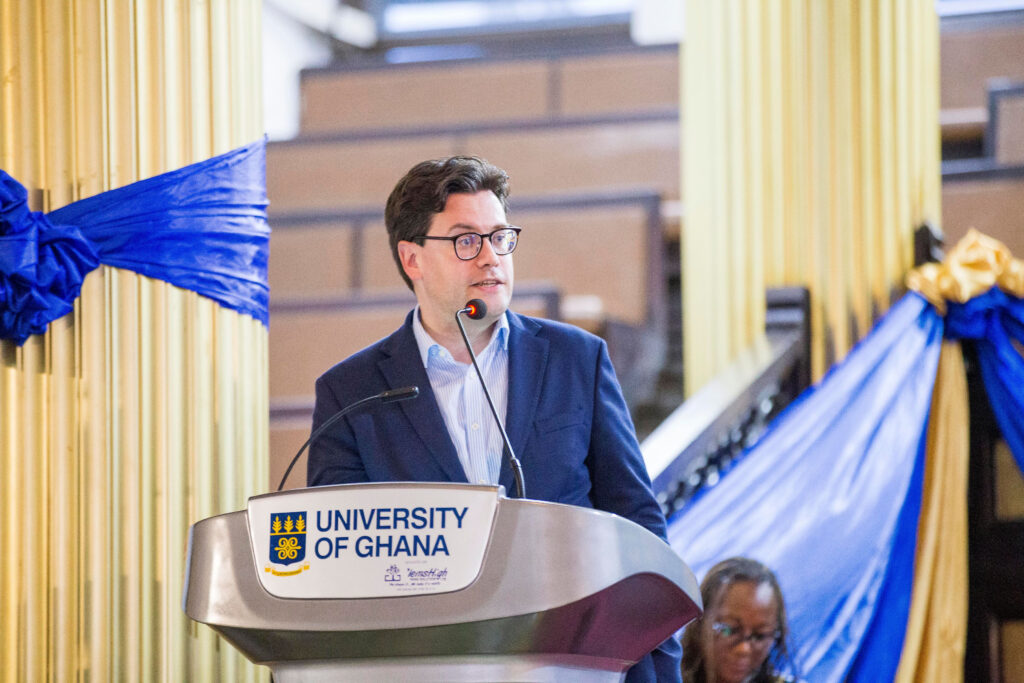Imagine a world where the simple act of going to the bathroom could help solve a global crisis. This is the promise of the “Tiger Toilet,” a well researched and innovative composting toilet that is increasingly becoming a resort for sustainable sanitation.
A case for this composting facility was made by Prof. Michael Templeton, a public health engineer and faculty at Imperial College London, at a recent Vice-Chancellor’s Occasional Lecture at the University of Ghana. The professor at the Department of Civil and Environmental Engineering highlighted this groundbreaking solution as part of a broader strategy to tackle the devastating impacts of inadequate sanitation worldwide.
The statistics are alarming he mentioned were that every hour, approximately two school buses full of children under five die needlessly from diarrhea because they lack access to basic water, sanitation, and hygiene. In terms of access to sanitation facilities, Prof. Templeton put the global figures at a reported 3.6 billion people who do not have access to safely managed sanitation facilities.

In his explanation of the situation, he mentioned that not having toiletry facilities meant their waste was not contained on-site or safely transported and treated off-site, which usually results in serious health outbreaks. This crisis demands innovative and sustainable solutions, and the Tiger Toilet is one such innovation making a significant difference.
“The Tiger Toilet, which uses composting worms to naturally treat waste, has been implemented in over 200,000 households across Africa, Asia, and South America. Unlike traditional pit latrines, the Tiger Toilet fills up only a third as quickly, reducing the frequency and cost of emptying” Prof. Templeton shared.
He noted that a high level of community engagement has been crucial in its success, and that has ensured that the design meets local needs and preferences. “Our testing showed that the Tiger Toilet, which uses composting worms to naturally treat waste, fills up only a third as quickly as a traditional pit latrine. Community engagement was also crucial to ensure the design met local needs and preferences,” explained Prof. Templeton.
For flood-prone areas, like parts of Ghana, a container-based sanitation service model is proving effective. Local companies regularly empty and transport portable toilets, treating the waste to generate useful byproducts like fertilizer or biogas energy through a circular business model. This approach not only addresses the sanitation crisis but also creates economic opportunities and sustainable waste management solutions.
During his lecture, titled “Research to Move towards Sustainable Sanitation for All,” Prof. Templeton emphasized the need for interdisciplinary research partnerships to develop and implement such innovative solutions. He shared case studies from 12 countries and showcased the outcomes of various successful projects. “As engineers, we need to address each part of this system to make it work better,” he stated, underlining the importance of a holistic approach to sanitation.
Vice-Chancellor Prof. Nana Aba Appiah Amfo, who chaired the event, reiterated the University of Ghana’s commitment to addressing critical public health issues like sanitation. Highlighting Ghana’s own challenges, particularly in urban slums and flood-prone areas, Prof. Amfo stressed the need for local solutions and community engagement. “Through engaging communities and working with local leaders, we aim to ensure all Ghanaians can live with dignity,” she stated.
The Tiger Toilet and other innovative sanitation solutions discussed by Prof. Templeton during the lecture offer researched solutions that could be very useful for adoption to address sanitation issues and ensure communities have access to safe and sustainable sanitation. However, the point remains that there is a critical need for collaborative efforts and community-driven approaches to achieve progress on global sanitation challenges. This will then lead to improving lives and preventing needless deaths from preventable diseases.